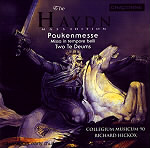Haydn’s Mass in Time of War is known in Germany as the Paukenmesse (Timpani Mass), owing to Haydn’s extraordinarily ominous use of solo drums in the “Agnus Dei”, an effect later borrowed by Beethoven in his Missa Solemnis. One of the most popular of Haydn’s masses, it receives a characteristically invigorating performance from Hickox, a little lacking in terror during those famous timpani solos, but otherwise handsomely played and sung. The fillers are very interesting, especially Haydn’s two settings of the Te Deum, both in C major, the earlier of which is making its CD premiere. The later setting is one of Haydn’s most brilliant and festive pieces, with a catchy unison opening that sounds a lot like a college fight song. This work had a potent influence on Bruckner’s Te Deum, and my only complaint about this performance is that Hickox omits the optional trombone parts, which would have made the piece even more explosive. And that’s really the story of the performances on this disc: fine work all around, but just a little tame at both ends of the interpretive spectrum.
































